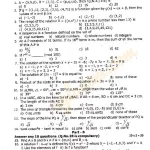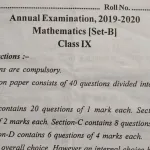Physics (20 Questions and Answers)
What is the function of a concave mirror in headlights of vehicles?
A concave mirror focuses the light to a point and reflects it as a parallel beam to illuminate the road ahead.
Why do we see lightning before we hear thunder?
Light travels faster than sound, so we see the lightning flash first and then hear the thunder later.
How does a fuse work in an electric circuit?
A fuse melts when excessive current flows through it, breaking the circuit and preventing damage to appliances.
Why is the sky blue in color?
Because molecules in the air scatter blue light from the sun more than other colors.
What is the role of the magnetic field in electric motors?
The magnetic field interacts with the electric current to produce a force that causes motion in the motor.
Why does a pencil look bent when placed in water?
Due to refraction of light, the pencil appears to bend at the surface of water.
How does a rainbow form?
Rainbows form when sunlight is refracted, dispersed, and reflected inside raindrops.
What happens to the resistance of a wire when its length increases?
Resistance increases because it becomes harder for electrons to flow through a longer path.
Why does a fan stop working when the current is switched off?
The electric current powers the motor. When it’s turned off, the motor stops rotating.
How can we reduce energy consumption at home?
By using LED bulbs, switching off unused appliances, and using energy-efficient devices.
Why is it dangerous to touch electrical equipment with wet hands?
Water conducts electricity, so touching equipment with wet hands increases the risk of electric shock.
How do lenses help in correcting eye defects?
They bend light rays in a way that the image focuses correctly on the retina.
What is the principle of the working of a generator?
Generators work on electromagnetic induction, converting mechanical energy into electrical energy.
Why are copper wires used in electrical circuits?
Copper is a good conductor of electricity and allows easy flow of current.
What happens to current if we increase the resistance in a circuit?
The current decreases as resistance opposes the flow of electrons.
Why do we use insulated wires in circuits?
Insulation prevents accidental shocks and short circuits.
What is the function of the switch in an electric circuit?
A switch controls the flow of current, allowing it to start or stop.
Why do electrical appliances become warm after use?
Due to resistance, some energy is lost as heat, making the appliances warm.
How does sound travel in solids, liquids, and gases?
Sound travels fastest in solids, slower in liquids, and slowest in gases due to particle density.
Why can’t sound travel through vacuum?
Sound needs a medium to travel. Vacuum has no particles, so sound cannot pass through it.
Chemistry (20 Questions and Answers)
What is rusting and how can it be prevented?
Rusting is the formation of iron oxide on iron due to moisture and oxygen. It can be prevented by painting or galvanizing.
Why is water called a universal solvent?
Because it can dissolve a wide range of substances.
What is an acid? Give an example.
Acid is a substance that releases hydrogen ions in water. Example: Hydrochloric acid.
What is a base? Give an example.
Base is a substance that releases hydroxide ions in water. Example: Sodium hydroxide.
Why does baking soda help in cleaning?
It reacts with dirt and grease, breaking it down and making it easier to remove.
What happens when acid reacts with metal?
It produces salt and hydrogen gas.
What is neutralization?
When acid and base react to form salt and water, the reaction is called neutralization.
Why do we feel a burning sensation during acidity?
Because excess acid in the stomach irritates the lining and causes discomfort.
What is the use of litmus paper?
Litmus paper helps to identify whether a substance is acidic or basic.
What is an indicator in chemistry?
An indicator is a substance that changes color in acids and bases to show their nature.
What are salts?
Salts are compounds formed when acid reacts with a base.
Why are metals shiny?
Because they reflect light from their surface, a property called metallic luster.
What is the difference between metals and non-metals?
Metals conduct electricity and are malleable, while non-metals are poor conductors and brittle.
Why is carbon important in chemistry?
Because it can form many compounds due to its ability to form four bonds.
What happens during combustion?
Combustion is a chemical reaction where substances burn in the presence of oxygen to produce heat and light.
Why does soap remove oil?
Soap molecules surround oil particles and help them mix with water for easy removal.
What is electrolysis?
It is the process of using electric current to break down compounds into elements.
Why is plastic not eco-friendly?
Plastic takes hundreds of years to decompose and harms the environment.
What is corrosion?
It’s the gradual destruction of materials, usually metals, due to chemical reactions with the environment.
What is the role of catalysts in reactions?
Catalysts speed up chemical reactions without being consumed in the process.
Biology (20 Questions and Answers)
What is the function of the heart?
The heart pumps blood throughout the body, supplying oxygen and nutrients to cells.
What are arteries and veins?
Arteries carry blood away from the heart; veins bring it back to the heart.
What is photosynthesis?
It is the process by which green plants make food using sunlight, carbon dioxide, and water.
Why do leaves appear green?
Because they contain chlorophyll, which reflects green light.
What is the function of stomata in leaves?
Stomata are tiny openings that allow gas exchange and water release.
How do roots help plants?
Roots absorb water and minerals and anchor the plant in the soil.
What is digestion?
Digestion is the process of breaking down food into simpler substances for absorption.
What is the function of the brain?
The brain controls body functions, thoughts, and emotions.
What is reproduction?
Reproduction is the process by which living organisms produce offspring.
What is the difference between asexual and sexual reproduction?
Asexual involves one parent and no gametes; sexual involves two parents and gametes.
What are hormones?
Hormones are chemical messengers that regulate various functions in the body.
What is the role of the kidney?
The kidney filters waste from the blood and forms urine.
How do vaccines work?
Vaccines train the immune system to recognize and fight disease-causing organisms.
What is respiration in living beings?
Respiration is the process of releasing energy from food.
Why do we sweat?
Sweating helps cool the body and remove waste through the skin.
What are the components of blood?
Blood contains red cells, white cells, platelets, and plasma.
How are plants adapted to dry environments?
They have thick leaves, deep roots, and reduced surface area to retain water.
What is the food chain?
It is the sequence of organisms where each is eaten by the next in the line of energy transfer.
Why is biodiversity important?
It maintains ecological balance and supports life on Earth.
What are chromosomes?
Chromosomes are thread-like structures in cells that carry genetic information.
Recommended Books for “10th Class ke Science ke Question” with Author, Publication & Content Overview
1. Science Success – Class 10
Author: Lakhmir Singh & Manjit Kaur
Publisher: S. Chand Publishing
Content: Includes chapter-wise theory, solved questions, HOTS (Higher Order Thinking Skills), NCERT-based exercises, and previous year board questions.
2. All in One Science – Class 10
Author: Arihant Experts
Publisher: Arihant Publications
Content: Detailed explanations, NCERT questions with solutions, sample papers, and concept maps for quick revision.
3. Together with Science – Class 10
Author: Rachna Sagar Experts
Publisher: Rachna Sagar
Content: Board-style questions, topic-wise summaries, MCQs, case-based and competency-based questions.
4. Xam Idea Science – Class 10
Author: Xam Idea Editorial Team
Publisher: VK Global Publications
Content: Conceptual clarity, NCERT in-text solutions, sample papers, and practice questions focused on latest CBSE pattern.
5. Oswaal CBSE Question Bank Science – Class 10
Author: Oswaal Editorial Board
Publisher: Oswaal Books
Content: Chapter-wise previous years’ questions, objective-type questions, case-based questions, and revision notes.
6. Examguru Science – Class 10
Author: Examguru Experts
Publisher: Full Marks Pvt. Ltd.
Content: Concept explanations, diagrams, value-based questions, and important notes for quick learning.
7. Pradeep’s Science – Class 10
Author: K.L. Goyal
Publisher: Pradeep Publications
Content: Comprehensive theory, detailed solved numerical and descriptive problems, and HOTS questions.
8. CBSE Chapterwise Science – Class 10
Author: MTG Editorial Team
Publisher: MTG Learning Media
Content: Past 10-year questions, topic-wise categorization, chapter summaries, and CBSE pattern objective questions.
9. Super 20 Science – Class 10
Author: MBD Group Authors
Publisher: MBD Publications
Content: Practice papers, concept refreshers, and 20 model tests to enhance exam readiness.
10. Target Science – Class 10
Author: Target Experts
Publisher: Target Publications
Content: Concept boosters, NCERT textbook exercises, multiple choice and descriptive practice sets.
11. CBSE Sample Papers Science – Class 10
Author: U-Like Team
Publisher: Best Book Publishing House
Content: Sample question papers based on recent CBSE pattern, including detailed solutions.
12. Score More Science – Class 10
Author: G.K. Publications
Publisher: G.K. Publications Pvt. Ltd.
Content: Quick revision notes, short tricks, chapter tests and scoring strategies.
13. 36 Sample Question Papers – Science
Author: Oswaal Editorial Board
Publisher: Oswaal Books
Content: Full-length sample papers, time management strategies, and answer writing tips.
14. Golden Science – Class 10
Author: Nirmal Chopra
Publisher: New Age Publishers
Content: Easy-to-understand notes, expected questions, NCERT exercises, and quick tests.
15. Evergreen Science – Class 10
Author: Evergreen Team
Publisher: Evergreen Publications
Content: Crisp summaries, chapter-wise questions, and creative learning exercises.
16. Foundation Science – Class 10
Author: H.K. Sehgal
Publisher: H.K. Publications
Content: Focuses on base concepts for competitive exams with well-organized theory and practice sets.
17. Smart Score Science – Class 10
Author: Vidya Editorial Board
Publisher: Vidya Publications
Content: Step-by-step solutions, scoring hints, and mixed practice sets.
18. NCERT Exemplar Problems – Science
Author: NCERT Editorial Team
Publisher: National Council of Educational Research and Training
Content: Application-based problems, HOTS questions, and reasoning-based MCQs.
19. Educart Science Question Bank – Class 10
Author: Educart Team
Publisher: Educart Publications
Content: Chapter-specific practice questions, assertion-reasoning questions, and board-focused papers.
20. Brain Mapping Academy Science Guide – Class 10
Author: BMA Experts
Publisher: Brain Mapping Academy
Content: Concept analysis, problem-solving approach, exam-targeted test series.
10th Class ke Science ke Question – Exam Focused Tips and Key Insights
10th class ke science ke question har student ke liye kaafi maayane rakhte hain, kyunki ye board exams ke preparation ka ek important part hote hain. Science subject teen major sections mein divided hota hai – Physics, Chemistry aur Biology. Har section ka apna unique pattern hota hai aur question types bhi alag hote hain. Yeh article aapko batayega ki kaise aap in questions ko ache se samajh kar score improve kar sakte hain.
Science ka syllabus 10th class mein conceptual clarity aur real-life applications par focus karta hai. NCERT textbook is the core reference, lekin uske beyond practice karna bhi zaroori hota hai. Board exam ke questions generally NCERT se hi aate hain, lekin unka framing thoda tricky hota hai. Isi liye aapko objective, short answer, long answer aur case-based question patterns ka deep understanding hona chahiye.
Physics ke questions mostly concepts aur numerical understanding par based hote hain. Topics jaise light, electricity, magnetic effects, aur the human eye pe conceptual clarity zaroori hai. Bahut baar assertion-reason type ya diagram-based questions bhi aate hain, jisme students ko answer karne ke saath reasoning bhi justify karni padti hai.
Chemistry mein mostly reactions, chemical properties aur equation balancing se questions bante hain. Important topics jaise acids, bases and salts, metals and non-metals, carbon compounds aur periodic classification par focus rehna chahiye. In topics se HOTS (Higher Order Thinking Skills) aur MCQs frequently board exams mein puchhe jaate hain.
Biology ke questions diagrams, processes aur system-based understanding pe based hote hain. Life processes, control and coordination, heredity and evolution, and our environment jaise topics se short aur long answer questions aate hain. Diagrams ke labeling aur functions explain karna bhi common question type hota hai.
10th class ke science ke question solve karne ke liye regular revision aur practice sabse zaroori cheez hai. Har chapter ke end mein given NCERT in-text aur exercise questions ko achhe se solve karein. Saath hi, mock tests aur sample papers attempt karke apna preparation level assess karein.
Experts kehte hain ki concept clarity aur daily practice se hi science subject mein command aata hai. Har chapter ka flowchart ya concept map banana kaafi helpful ho sakta hai, especially jab quick revision ki baat aaye. Time management bhi crucial role play karta hai exam ke din. Isliye aapko time-bound question solving ki habit develop karni chahiye.
Board exam pattern ke hisaab se ab case-based aur competency-based questions bhi include kiye ja rahe hain. Aise questions real-world scenarios par based hote hain jisme students ko apply, analyze aur evaluate karna padta hai. Aap jitni zyada practice karenge, aapka confidence utna hi badhega in new types of questions ko tackle karne mein.
Agar aap 10th class ke science ke question ache se samajhna chahte hain, toh topic-wise question banks, previous year papers aur self-assessment worksheets ka use kijiye. Isse aapko exam pattern ka actual experience milega aur errors ka analysis bhi ho payega.
FAQ for 10th Class ke Science ke Question
Q1: 10th class ke science ke important chapters kaunse hain?
Important chapters include Light – Reflection and Refraction, Human Eye and the Colourful World, Electricity, Acids-Bases-Salts, Metals and Non-metals, Carbon Compounds, Life Processes, Heredity and Evolution, and Our Environment.
Q2: Board exams ke liye NCERT book kaafi hai kya?
Haan, NCERT textbook hi base hoti hai board exams ke liye. Lekin, achhi practice ke liye additional question banks aur sample papers bhi solve karna chahiye.
Q3: Science ke objective-type questions kaise prepare karein?
Har chapter ke end ke NCERT questions revise karein. MCQ-based sample papers aur case-based questions regular solve karne se practice strong hoti hai.
Q4: Numerical problems kaise achhe se solve karein?
Formula yaad karne ke bajay concepts ko samjhein. Step-by-step solution likhne ki habit banayein aur har numerical ke unit par dhyan dein.
Q5: Kaunse types ke questions zyada aate hain board exam mein?
Short answer, long answer, assertion-reason, MCQs, and case-based questions zyada aate hain. Diagram-based questions bhi important hote hain, especially in Biology.
Q6: Diagrams ke liye kya tips hain?
Clear and labeled diagrams banayein. Practice daily karein aur textbook ke diagrams ko reference ke liye use karein.
Q7: Kaise pata chalega ki kis chapter se kitne questions aate hain?
Previous year question papers aur sample papers ko analyse karein. Isse aapko chapter-wise weightage ka andaza ho jaayega.
Q8: Kya online mock tests se preparation improve hoti hai?
Bilkul. Mock tests aapki speed, accuracy aur time management improve karte hain. Aapko exam pressure ka real experience milta hai.
Q9: Agar theory weak hai to kaise strong banayein?
Everyday short notes banayein aur voice recording method ka use karein. Concept maps aur flowcharts se visual memory enhance hoti hai.
Q10: Science mein full marks score karna possible hai kya?
Haan, agar aap regular revision, proper diagram practice aur clear presentation follow karte hain, to full marks score kiya ja sakta hai.
Q11: Case-based questions kaise handle karein?
Pehle case ko dhyan se padhein, fir questions ko analyze karein. Answers hamesha concept-based aur relevant hone chahiye.
Q12: Revision ke liye best time kya hai?
Daily revision evening ya night mein karein jab distraction kam ho. Weekend pe full syllabus revision karna effective hota hai.
Q13: Exam se pehle last-minute preparation kaise karein?
Quick notes, flashcards, aur previous year question solving pe focus karein. Naye topics last moment par na padhein.
Q14: Kya self-study se board exam clear ho sakta hai?
Bilkul. Agar aap disciplined hain, proper schedule follow karte hain aur smart practice karte hain, to self-study bhi kaafi hoti hai.
Q15: Science ki answer writing skills kaise improve karein?
Point-wise answers likhein, keywords underline karein, aur diagram ya example zarur include karein jahan bhi possible ho.
Latest Posts
- Step-by-step guide to download and apply for jee mains admit card 202
- Comprehensive 2025 government holidays and recruitment details for job seekers
- JEE Mains Admit Card 2025: Your Step-by-Step Guide to Downloading the Hall Ticket
- Everything You Need to Know About 2025 Government Holidays Recruitment
- Comprehensive Guide to rrb d group recruitment 2025 – Eligibility, Vacancies, and Application
- Detailed guide to nps trust recruitment 2025 vacancies, eligibility and apply process
- Comprehensive guide to hpcl recruitment 2025 notification, vacancies, and application process
- ignou bed admission 2025 complete recruitment guide with eligibility and process
- Comprehensive Guide to Indian Army Agniveer Recruitment 2025 Notification and Jobs
- Everything You Must Know About CBSE Board Exams 2025 Changes & New Rules






